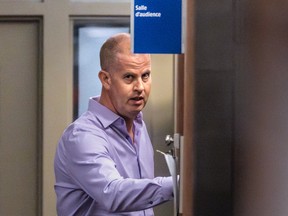“I was isolated from the others because I had special treatment from my coach,” woman testifies at Daniel Lacasse’s trial.

The woman who alleges she had sex on a regular basis with her basketball coach at a high school in the St-Laurent borough said during his trial on Thursday that he made a key decision while she was playing that left her miserable.
The woman, whose identity is protected by a standard publication ban, contacted the Montreal police twice years after she graduated from École secondaire St-Laurent. Following her first call, she did not pursue the matter seriously but made contact with the police again in 2020. Daniel Lacasse, the complainant’s head coach when she was in Secondary 5, and two other basketball coaches at the school were arrested early in 2022.
Lacasse is charged with sexual exploitation and his trial began earlier this week. The two other coaches face multiple charges, including sexual assault, and are scheduled to have trials in November and January. All three of the coaches have since been fired.
While answering questions from prosecutor Jérôme Laflamme his week, she said Lacasse ran the basketball program at what was then called École secondaire Emile-Legault. She said that in 2006, Lacasse invited her to attend the school after she participated in a one-day tournament while she was in primary school. She also said he ended up supporting her financially because her family was struggling after immigrating to Canada. She said Lacasse gave her money for food and paid for expenses like a brace for her knee and an MRI after she injured her ligament while in Secondary 3.
She also testified that by Secondary 5 she was sleeping often on Lacasse’s couch to avoid problems in her family and ended up having sex with her coach on a regular basis, beginning when she was 16. She also alleges the relationship continued when she went to college and came to an end when she decided to date someone her own age.
On Thursday, the complainant answered questions from Eddy Ménard, Lacasse’s defence lawyer. During the cross-examination, the woman said Lacasse made an important decision to promote her, from bantam to midget, and have her play with girls who were older than her.
“Daniel had already made the decision that I should go to midget. So when I had a meeting with the (midget coach) after I was in Secondary 1, he told me it was out of his power and that Daniel had already made the decision before I even played in Secondary 1,” the woman said, adding the decision eventually made her miserable.
“Are you 100 per cent sure it was (Lacasse’s) decision,” Ménard asked.
“Yes, 100 per cent,” she said, adding later that she was reluctant to leave her previous team because it had performed well in the league it was in.
At that point, Lacasse was running the school’s basketball program and was the head coach of the school’s junior team.
“I was the captain (of the midget team) and I was the youngest on team. So the other kids did not like that. I was bullied on the team. I was isolated from the others because I had special treatment from my coach. I was being insulted by my teammates. I went into a depression. I hit rock bottom. I didn’t want to play (with the older girls) anymore. It wasn’t fun,” she said. “I mentioned this a couple of times and they didn’t let me (go back to the younger team).”
The complainant said she didn’t tell her mother about the misery she was experiencing but did tell a social worker.
“I didn’t have to say much. It was witnessed by everybody. So they had a conversation with Daniel (and the coaches on midget and bantam teams). Also, people had quit that year. The midget team wasn’t going well,” she said.
Later on in the cross-examination, Ménard asked the woman if she is certain Lacasse paid for her MRI. Originally, she said he took her to a private clinic because of the lengthy wait times in Quebec’s medicare system and that he paid for the MRI with a credit card.
When Ménard suggested the MRI and her surgery on the ligament were actually covered by an organization, she said: “I don’t recall.”